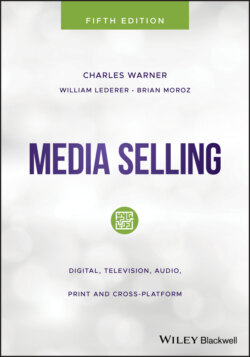Читать книгу Media Selling - Warner Charles Dudley - Страница 28
Digital‐Era Media Are Still “The Media”
ОглавлениеEven though the Internet spawned new ways to create, publish, and distribute news and entertainment content and new ways to buy advertising programmatically, the newly created media platforms such as Google and Facebook are still perceived to be “the media” by the public. The media, including digital media, are ubiquitous and powerful, and they transmit advertising, political, cultural, social, and moral messages (either intended or unintended) to a mass audience. Over the years “the media” has been under attack from both the right and left of the political spectrum. In the 1960s, as you learned in Chapter 1, Theodore Levitt defended advertising from critics who thought it was creating a materialistic society. In the 1970s, conservative hawks accused “the media,” particularly television, of vilifying the military and for the loss of the war in Vietnam. In the 1990s, liberals and Democrats accused “the media” of prosecuting President Bill Clinton. In the 2016 presidential election “the media” were accused of distributing fake news, especially by Donald Trump.
However, “the media” is not a single, monolithic entity. Media is a plural noun that includes a multitude of outlets – television, digital platforms, radio, newspapers, magazines, out‐of‐home advertising (billboards and posters), and digital and printed newsletters – that communicate in a multiplicity of voices, political orientations, and opinions.
Because of the complex and fuzzy combination of show business and public service, the media have always been and will continue to be loved and hated, praised and vilified, regulated and deregulated, and given credit or blamed for everything from keeping our nation free to poisoning the minds of our children. Salespeople in the media must learn to deal with all types of extreme reactions and to accept the fact that they, as representatives of their medium, will have to face these, often highly emotional, reactions on a daily basis.
The good news is that, as a salesperson for a medium, you will often have easy access to clients. The bad news is that your medium will be blamed for everything from a client’s sore back to the election of an unpopular president, and you will have to listen to the reasons for your medium’s and all of the media’s failures. Many people tend to lump all the media together as a monolithic target for their anger, so it does not matter if you are selling for a website, a television network, a radio station, or a newspaper, you will probably get comments about how awful the media are. You will have to learn to listen non‐defensively, not to take insults personally, and to respond unemotionally and good‐naturedly to criticism.
